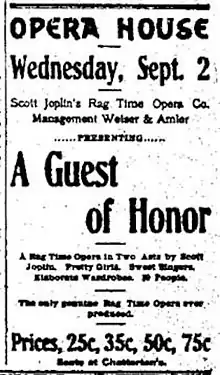A Guest of Honor (opera)
A Guest of Honor (ISJ 54)[1] is the first opera created by celebrated ragtime composer Scott Joplin. The opera had two acts, followed the model of grand opera,[2] and followed the events surrounding the 1901 White House dinner hosted by President Theodore Roosevelt for the civil rights leader and educator Booker T. Washington.[3]

History
Joplin is believed to have begun writing A Guest of Honor shortly after Washington’s visit to Roosevelt’s White House. A copyright application was filed on February 16, 1903, with the Library of Congress,[2] but Joplin did not include a copy of the score with the application, but did list Stark Publishing on the application. It is theorized that he intended to have the score published prior to the copyright submission, but this never happened despite the application.[3]
In April of 1903, a informal public presentation of the opera was reviewed by Monroe Rosenfeld of the St. Louis Globe-Democrat.[4] The performance had taken place "In a large hall where they often gave dances," Rosenfeld noting the company's daily rehearsals at the Crawford's Theatre in Louisiana (now Gayety Theatre).[5] He also noted the opera's financial backing, and noted the opera's premiere date as August 30th of 1903.[2]
Joplin later created an opera company called the "Scott Joplin's Ragtime Opera Company"[2][Note 1] of about 30-32 people to take A Guest of Honor for a national tour. It is not certain how many productions were actually staged, or even if this was an all-black show or a racially mixed presentation (which would have been very unusual for 1903). He would later take the company on tour in August of 1903, continuing into October. The tour was ostensibly scheduled for 15 stops, although how many were fulfilled is unknown.[2]
During the tour, either in Springfield, Illinois, or Pittsburg, Kansas, someone associated with the company stole the box office receipts. Joplin could not meet the company’s payroll or pay for the company’s lodgings at a theatrical boarding house. It is believed the score for A Guest of Honor was confiscated with Joplin’s belongings, due to non-payment of his bills.[6] Joplin would later travel to New York in 1907 in order to find financial support and a publisher for the opera, but did not manage to find support.[6] Overall, it is reported that the tour was a financial failure for Joplin, although from 1907 onward Joplin was again busy working on his second opera, Treemonisha.[2] Scholar Edward Berlin's research noted Joplin's readiness to leave his first opera behind:
I have not discovered a single reference to the opera after 1903. Whereas from 1907 on, Joplin rarely missed an opportunity to mention he was working on an opera (which was to be Treemonisha), or, from 1911, that he had completed it, he never cites it as his second opera. It is as if he wanted to pretend A Guest of Honor had never existed.
Edward Berlin, Chapter 10: "A Guest of Honor, 1903," from King of Ragtime: Scott Joplin and His Era (2016, 2nd Edn.)
To date, no copy of the score to A Guest of Honor has ever surfaced, and it is considered lost. However, a card dating from March 27th of 1906 noted that two copies due to be received by the Copyright Office did not come. Later confirmation from William P. Stark, son of John Stillwell Stark, noted the overall weakness of the opera, "While A Guest of Honor had some pretty good music, the story and lyrics were weak, and it was never published."[2]
Details
Joplin had dedicated his first opera to Pharoah T. Bowles, a resident of Missouri.[7][1]
The title of the opera, "A Guest of Honor," was used verbatim in an editorial dating to September 12th, 1901 from the Indianapolis Freeman. It is known that Joplin was an avid reader of the journal.[2]
Notes
- The group was also called a minstrel group at times.
References
- "A Guest of Honor (Joplin, Scott) - IMSLP: Free Sheet Music PDF Download". imslp.org. Retrieved 2023-01-07.
- Berlin, Edward (2016). "A Guest of Honor, 1903". King of Ragtime. pp. 148–168. doi:10.1093/acprof:oso/9780199740321.003.0010. ISBN 978-0-19-974032-1. Retrieved 2023-01-07.
- Biography from ScottJoplin.org Archived 2007-02-24 at the Wayback Machine
- "Scott Joplin Guest of Honor Crawford Theater". Sedalia Weekly Conservator. 1903-08-22. p. 2. Retrieved 2023-01-07.
- "Gayety Theatre in St. Louis, MO - Cinema Treasures". cinematreasures.org. Retrieved 2023-01-07.
- "Classical Net - Basic Repertoire List - Joplin". Retrieved 3 March 2017.
- Commission, United States Civil Service (1905). Official Register of the United States ... U.S. Government Printing Office.
External links
- Article on A Guest of Honor
- Sedalia Weekly Conservator August 22, 1903 formation of A Guest of Honor
- New York Clipper September 12, 1903 report of schedule of three performances of A Guest of Honor